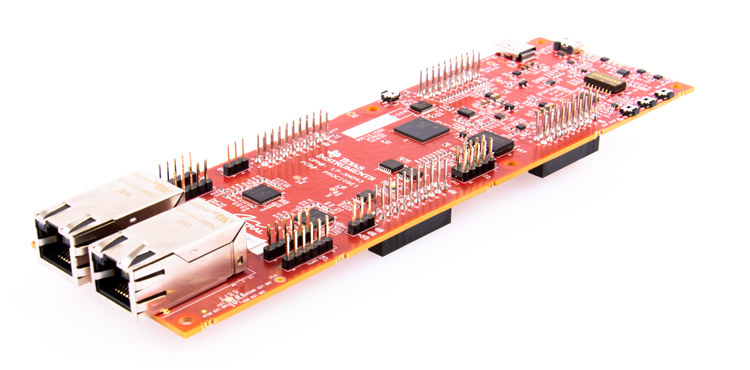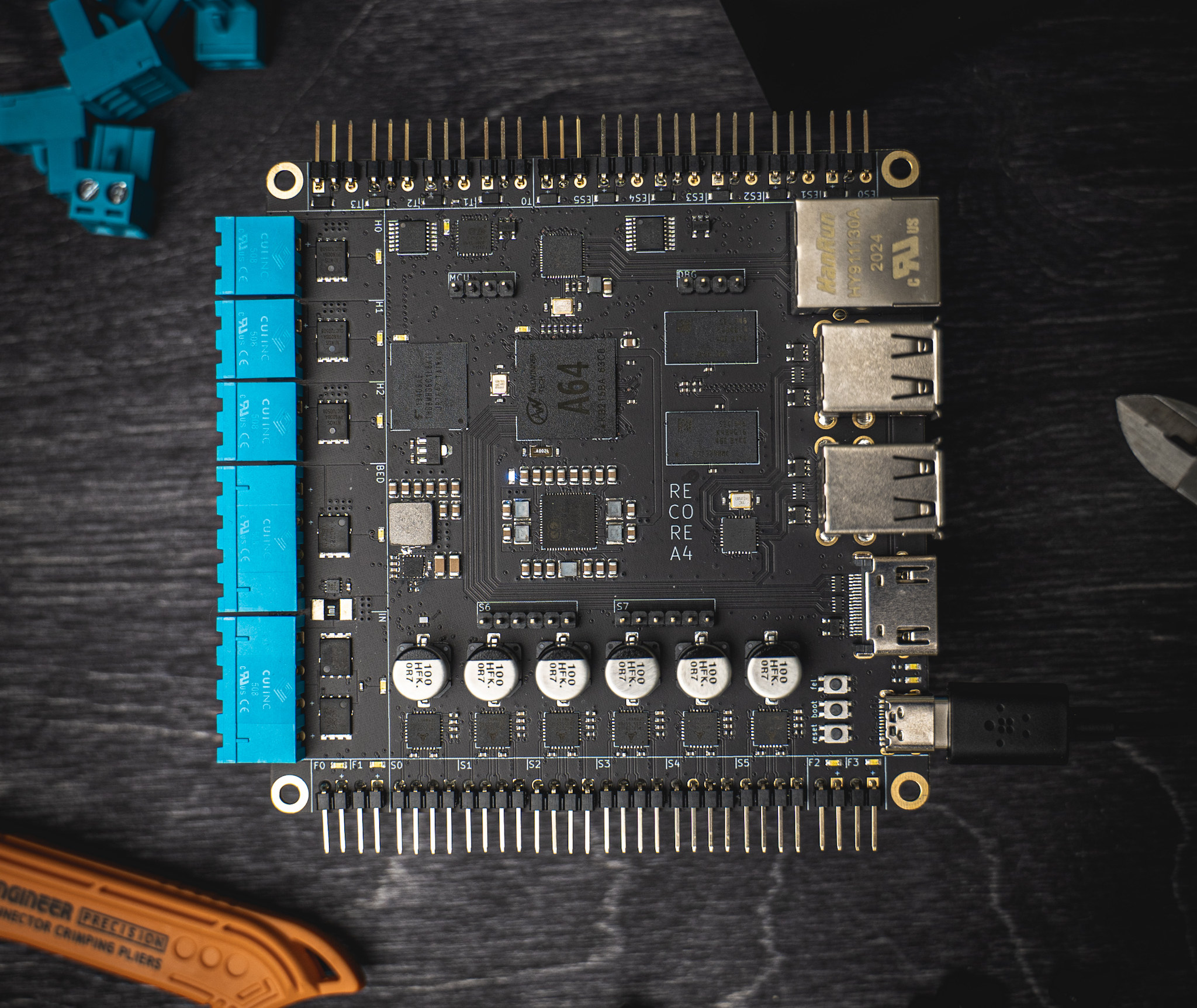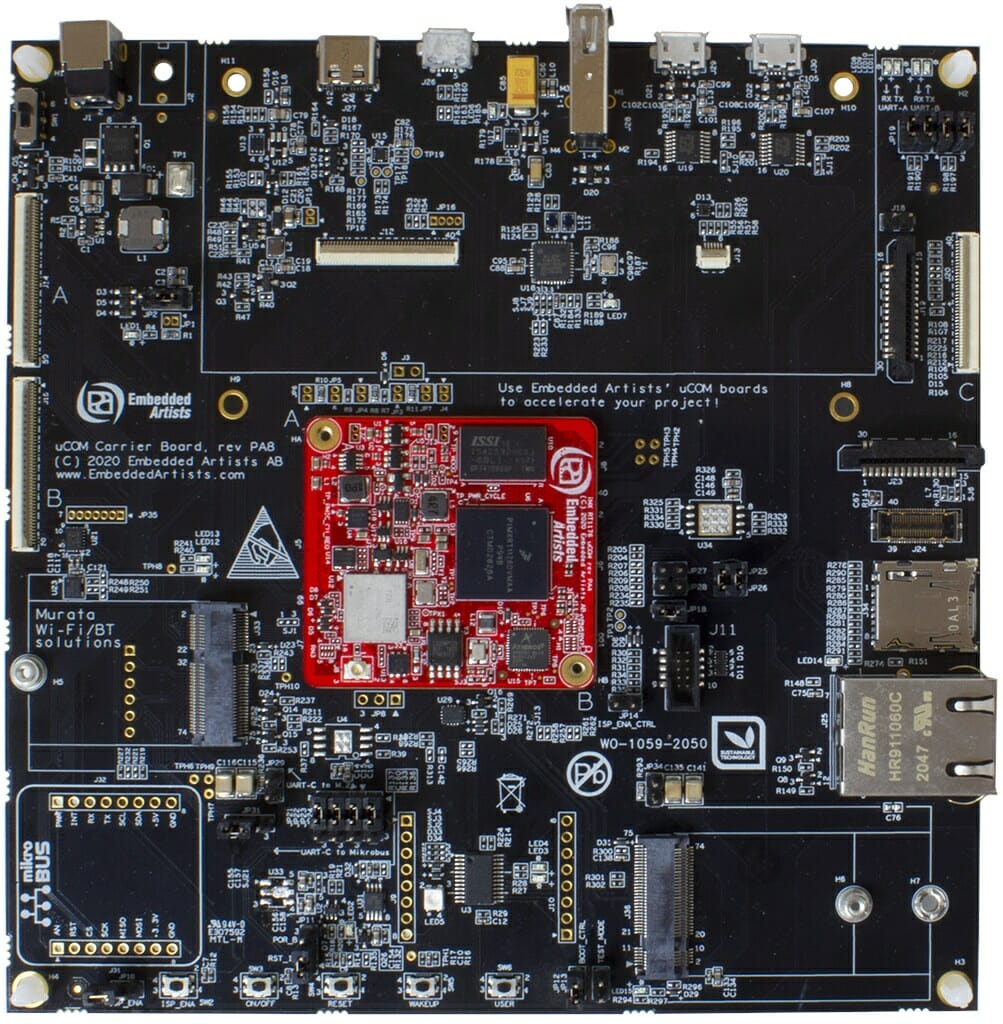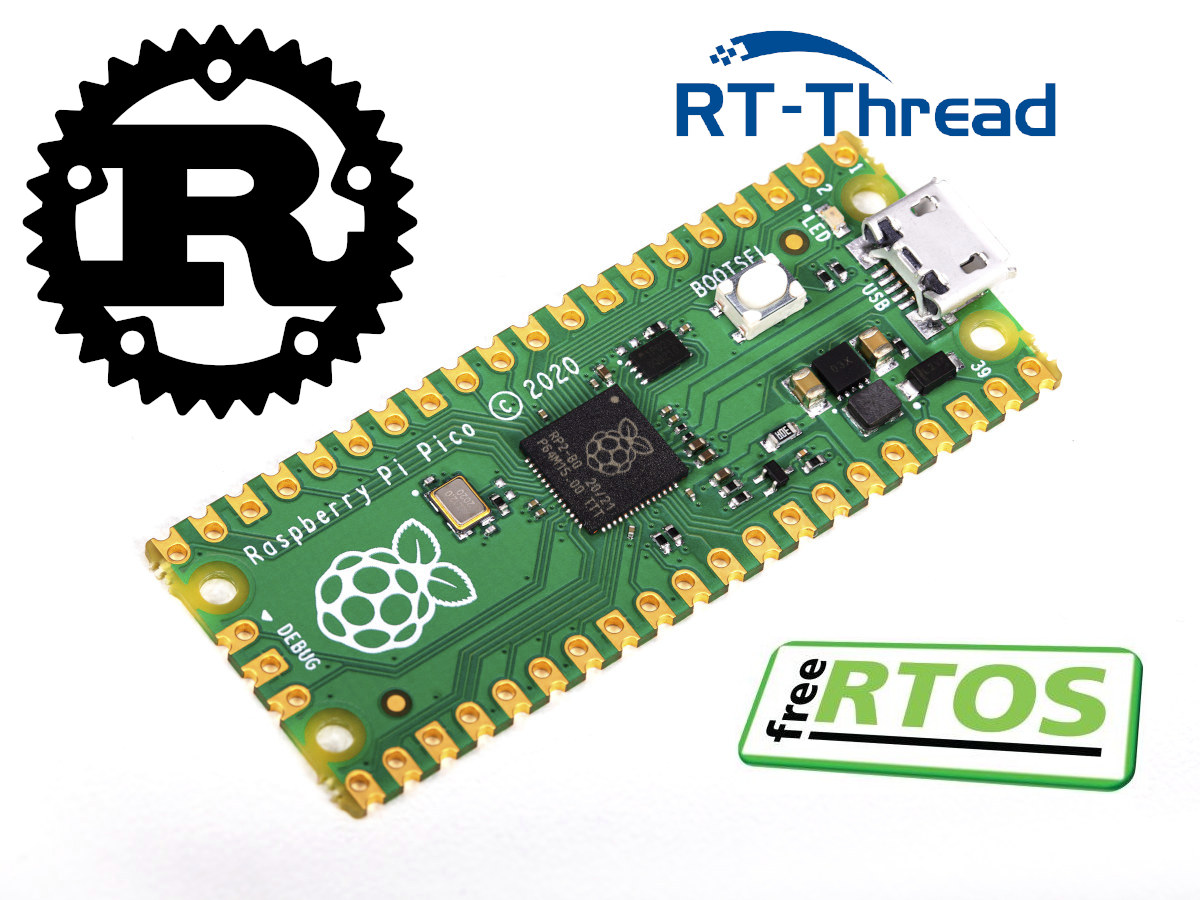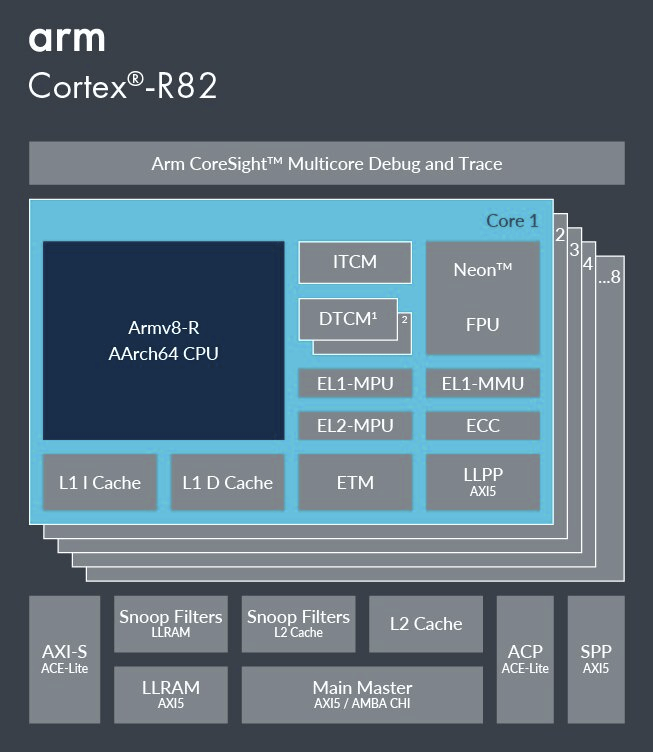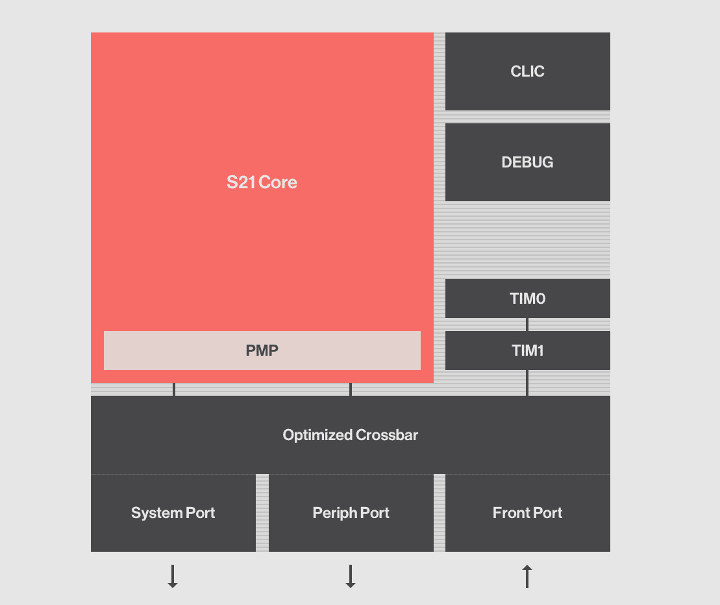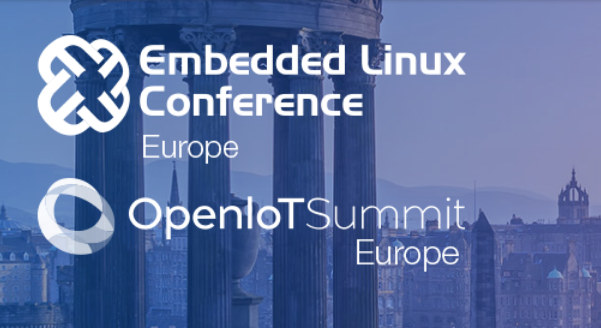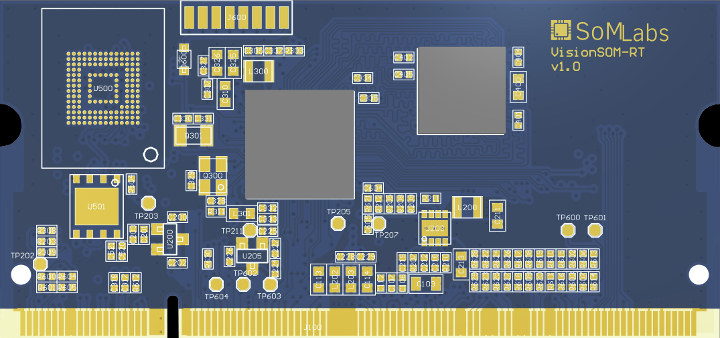The few microcontroller boards that get Ethernet, are often limited to 10 Mbps or 100 Mbps, but the LP-AM243 LaunchPad development kit comes with two Gigabit Ethernet ports controlled by the newly announced 800 MHz Texas Instruments Sitara AM243x Cortex-R5F microcontroller with industrial communication and security features. TI Sitara AM243x Cortex-R5F microcontroller The Sitara AM243x is the first family of microcontrollers part of the larger Sitara AM2x MCU series that, a bit like NXP i.MX RT crossover processors, aims to combine the advantages of traditional microcontrollers and microprocessors by leveraging the real-time capabilities of the former and the high performance of the latter, but in a way optimized for industrial communication and safety. The Sitara AM243x family is comprised of three processors with one, two, or four cores with the following key features and specifications: CPU AM2431 – Single-core Cortex-R5F real-time core @ 800 MHz with 128KB TCM AM2432 – Dual-core […]
3D printer board leverages Allwinner A64’s AR100 core for real-time control
Elias Bakken has been working on Recore 3D printer control board based on Allwinner A64 processor since 2019 and with revision “A5” of the PCB, Recore is now considered stable and will ship to customers. But wait? Isn’t Allwinner A64 just a quad-core Cortex-A53 processor meant to run Linux? But 3D printer control boards require real-time I/O and that’s why many are designed with STM32, Arduino compatible Microchip MCU or other microcontrollers. The trick here is that Elias did not use the Cortex-A53 cores for real-time control, but instead the 300 MHz AR100 32-bit OpenRISC 1000 core found in Allwinner A64 SoC. Recore specifications: SoC – Allwinner A64 quad-core Cortex-A53 processor running at 1 GHz, with AR100 32-bit core @ 300 MHz, Mali-400MP2 GPU System Memory – 1 GB DDR3 RAM Storage – 8 GB eMMC flash Video Output – HDMI output to connect a display Networking – Gigabit Ethernet […]
Embedded Artists launches 1GHz NXP i.MX RT1176 Crossover MCU module and devkit
Microcontrollers used to be those cute little chips clocked at 8 MHz, but it’s now common to have MCUs clocked at one or two hundred Megahertz, and with Cortex-M7 cores, several hundred Megahertz is now possible, and NXP even pushed the limit to one Gigahertz with their i.MX RT1170 series of Cortex-M7/M4 Crossover MCUs announced over a year ago. Embedded Artists has now made a computer-on-module and a corresponding devkit based on NXP i.MX 1176 Crossover MCU clocked at one Gigahertz. iMX RT1176 uCOM MCU module delivers up to 6468 Coremarks, comes with up to 32MB SDRAM, 16MB QSPI flash, optional WiFi and Bluetooth, and various peripherals in a tiny 45x42mm form factor. iMX RT1176 uCOM module Specifications: SoC – NXP i.MX RT1176 processor with Cortex-M7 core up to 1 GHz/800MHz (Commercial vs industrial), Cortex-M4 core up to 400/200 MHz, 2MB internal SRAM, 2D GPU with OpenVG 1.1 support and […]
Raspberry Pi Pico Gets supports for Rust, RT-Thread OS and FreeRTOS
In January end, we saw the launch of Raspberry Pi Pico equipped with an RP2040 dual-core Cortex-M0+ microcontroller working up to 133 MHz with official support for MicroPython and C. In this feature, we will be discussing the Raspberry Pi Pico’s flexible software support compatible with RP2040 MCU, apart from the MicroPython, C/C++, and upcoming Arduino IDE software support. We will specifically be focusing on Rust, RT-Thread OS, and FreeRTOS support for Raspberry Pi Pico. Rust Code Running on Raspberry Pi Pico Rust language is considered fast, reliable, and secure when it comes to IoT gateways. It also opens up the option for writing extremely low-level code, such as operating system kernels or microcontroller applications. Porting Rust with RP2040 for working with Raspberry Pi Pico was seen in Jonathan Pallant’s Twitter Feed. The RP2040 comes with an external QSPI flash. The internal mask-ROM reads the programs from the external flash […]
Arm Cortex-R82 is a Linux Capable, 64-bit Real-time Processor for Computational Storage Applications
Arm hast just unveiled Cortex-R82 64-bit real-time processor that is Linux-capable and designed for “next-generation enterprise and computational storage solutions”. What’s computation storage? To clearly understand what we’re dealing, let’s first find out what computational storage is via SNIA website: Computational Storage is defined as architectures that provide Computational Storage Services coupled to storage, offloading host processing, or reducing data movement. A Computational Storage Service (CSS) is a data service or information service that performs computation on data where the service and data are associated with a storage device. So If I understand correctly, so far all we asked from SSD’s, hard drives, and other storage, was to move and store data as fast as possible to a host device capable any analyzing the data. But computational storage brings this to the storage device itself, so we may soon have Smart Hard Drives that run Linux and do some of […]
SiFive S2 RISC-V Core may be the World’s Smallest 64-bit Embedded Core
Last year, SiFive introduced their first RISC-V cores competing with Arm Cortex-R family of processors thanks to their S7 Series 64-bit RISC-V Core IP providing an answer to Arm Cortex-R7/R8 32-bit real-time processors. The company has now announced the SiFive S2 RISC-V core that it claims to be the world’s smallest 64-bit embedded core, and also the first SiFive IP core without any direct competitive equivalent in the market. For now, there’s only one core in the family with SiFive S21 offering the following key features: RISC-V ISA – RV64IMAC 64-bit AXI Ports Machine and User Mode with 4 Region Physical Memory Protection 3-stage pipeline with Simultaneous Instruction and Data Access 2 Banks of Tightly Integrated Memory (TIM) CLIC (Core Local Interrupt Controller) with 127 interrupts Advanced debug with 4 hardware breakpoints/watchpoints Performance – 1.6 DMIPS/MHz; 3.2 Coremarks/MHz The company compares its to the SiFive S5 cores, which I had […]
Embedded Linux Conference Europe & OpenIoT Summit Europe 2018 Schedule
The Embedded Linux Conference & OpenIoT Summit 2018 took place in March of this year in the US, but the European version of the events are now planned to take place on October 21-24 in Edinburg, UK, and the schedule has already been released. So let’s make a virtual schedule to find out more about some of interesting subjects that are covered at the conferences. The conference and summit really only officially start on Monday 22, but there are a few talks on Sunday afternoon too. Sunday, October 21 13:30 – 15:15 – Tutorial: Introduction to Quantum Computing Using Qiskit – Ali Javadi-Abhari, IBM Qiskit is a comprehensive open-source tool for quantum computation. From simple demonstrations of quantum mechanical effects to complicated algorithms for solving problems in AI and chemistry, Qiskit allows users to build and run programs on quantum computers of today. Qiskit is built with modularity and extensibility […]
VisionSOM-RT is an Industrial System-on-Module based on NXP i.MX RT Arm Cortex-M7 Processor
It’s hard to keep up with all the systems-on-module based on Arm Cortex-A “application class” processors, but so far I can’t remember seeing any Arm Cortex-M “microcontroller class” SoM. However, SoMLabs is currently working on VisionSOM-RT, a system-on-module based on NXP i.MX RT 1050 Arm Cortex-M7 processor clocked at 600 MHz. NXP i.MX RT series processors are actually promoted as a “crossover” processor delivering application processor performance with real-time capabilities right at the edge between the two classes of processors. VisionSOM-RT (SLS12Rx) module preliminary specifications: SoC- NXP i.MX RT Arm Cortex-M7 processor @ up to 600MHz with NXP PXP 2D graphics accelerator, and Graphics Engine PXP PiXel processing pipeline for imagine resize, rotation, overlay and color space conversion. Memory – 512kB on-chip RAM memory, up to 32MB SDRAM Storage – Up to 16MB QuadSPI flash, optional 4GB eMMC flash 200-pin SO-DIMM edge connector with Display Interface – 8/16/24-bit Parallel RGB […]


